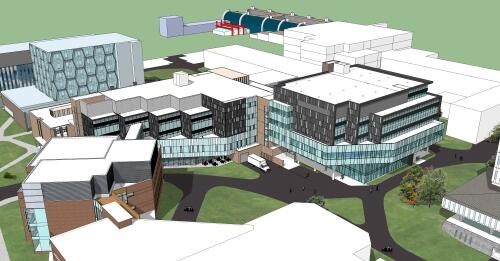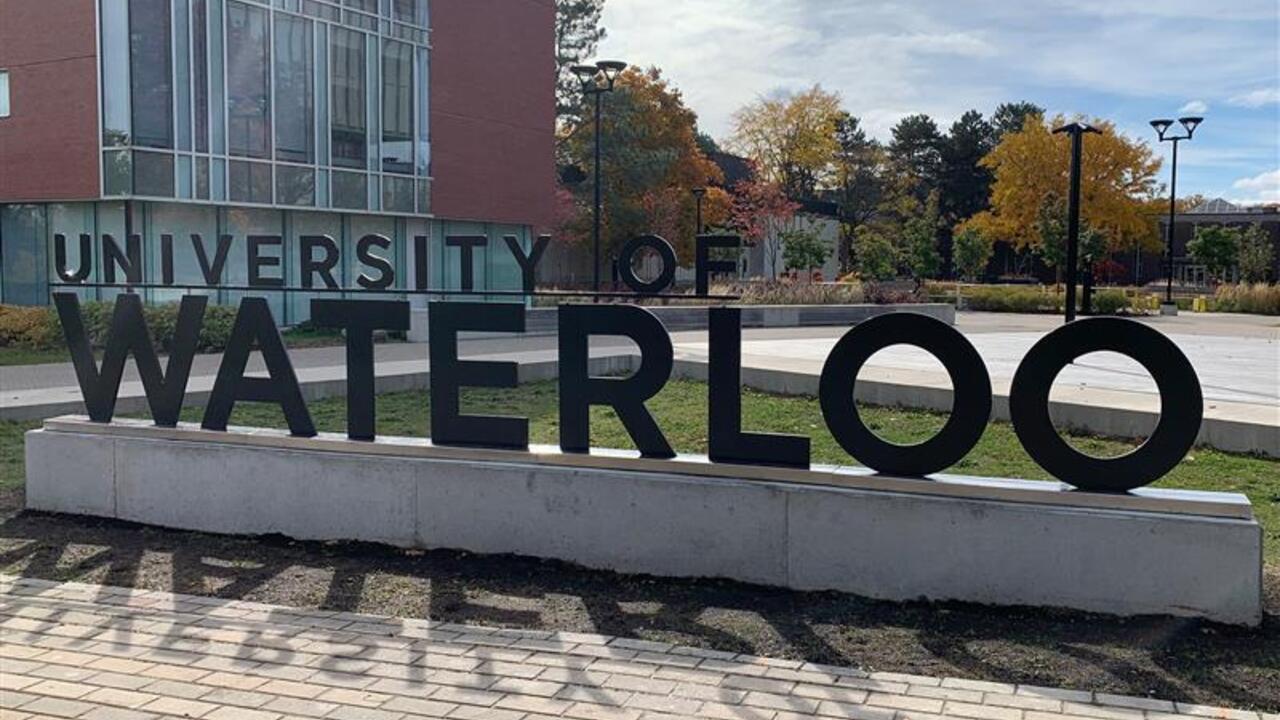
A rendering of the new Science Complex at Waterloo.
The new $95 million Science Complex will expand laboratory space at Waterloo by more than 40,000 square feet for innovation in bio-based chemistry, materials and nanoscience, quantitative biology, metagenomics and synthetic biology.
“Waterloo’s reputation for innovation is rooted in the world-class research that takes place here. Today’s investment in the Science Complex will allow us to build new facilities that will support innovation in emerging fields of science,” said Feridun Hamdullahpur, president and vice-chancellor at Waterloo. “The investment also allows us to expand capacity to support world-leading experiential learning with hands-on lab experience as well as fostering a new strain of science-based entrepreneurs though our Velocity Science program."
The 215,000 square foot complex will provide significant additional teaching space to meet growing demand for undergraduate and graduate students and critically adds space for new undergraduate programs in materials and nanoscience and bio-based chemistry.
“Today’s funding is an exciting opportunity for Science at Waterloo to expand support for researchers, students and entrepreneurs who will shape the future by pushing our understanding of the world around us,” said Bob Lemieux, dean of the Faculty of Science. “This new facility for scientific teaching and discovery will help ensure that Waterloo continues to fuel world-changing innovation that is underpinned by a fundamental understanding of the world around us.”
The new teaching spaces will feature more undergraduate laboratories offering students enhanced access to hands-on experiences in student research and innovation allowing Waterloo to expand access to high-demand co-op stream programs. Additional student laboratory space will foster the development of a new generation of science-based startups and entrepreneurs with an expansion of the Velocity Science program.
Velocity Science provides students interested in a life- or materials-science startup with the right tools and resources to initiate and develop world-class science companies. To date, more than 20 companies have emerged from Velocity Science including Suncayr, whose innovative nanotechnology marker signals users when it's time to reapply sunscreen, and Medella Health, a start-up that is developing the next generation of contact lens wearable technology to help patients better manage their diabetes.
“Our Government’s support for public infrastructure has never been stronger. We are pleased to work with our partners to approve projects under the New Building Canada Plan as we focus on creating jobs, promoting growth, and building strong, prosperous communities across Canada,” said Peter Braid, Member of Parliament for Kitchener—Waterloo. “We are proud to announce our intention to invest in the University of Waterloo Science Complex, which will focus on developing a highly-skilled workforce driving innovation in sectors that support increased economic diversification and competitiveness in Ontario.”
Federal funding for the building project comes from the New Building Canada Fund’s Provincial-Territorial Infrastructure Component-National and Regional Projects. The Government of Canada selected this project for funding consideration of up to one third of eligible costs, to a maximum of $24,708,200.
Background
The Faculty of Science at Waterloo is leader in research nationally and internationally. From a new map of the universeto better batteries to the threat of invasive species, Science researchers are committed to sharing exciting and relevant research findings with the Canadians and the world.
Science at Waterloo features:
- Internationally renowned faculty members including two Canada Excellence Research Chairs and 14 Canada Research Chairs;
- $58.5 million dollars in research funding for 2014/15 - 32 per cent of the University’s total research income.
- 13 bachelor degree programs and in the departments of Biology, Physics and Astronomy, Chemistry, and Earth and Environmental Sciences and four cross-faculty bachelor degree programs with Accountancy, Business, Economics and Aviation;
- Two world-class professional schools – Canada’s only English-speaking School of Optometry and Vision Science and the newest and only co-op School of Pharmacy in Canada;
- Successful hands-on education though lab and field courses, clinical rotations and award-winning programs such as iGEM.
- Our co-op program boasts a 95 per cent placement rate and five degrees associated with professional designations.
- Innovative community outreach programs, including the Earth Science Museum, the annual Science Open House, Let’s Talk Science Waterloo K-12 program, Engineering Science Quest (ESQ) and engaging public lecture events, such as Invasions from Inner Space: Species Invasion and Extinction.









